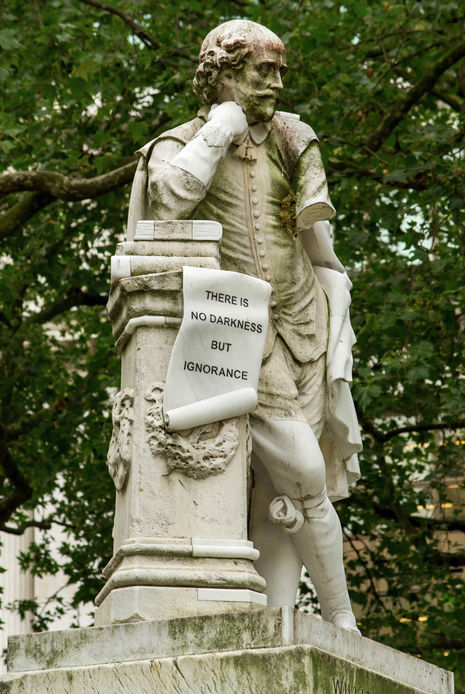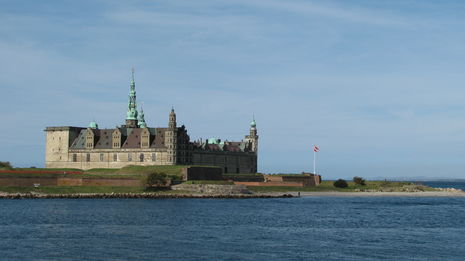All The World’s Shakespeare’s Stage
Theatre’s staff writer, Margaux Emmanuel, discusses her relationship to Britain’s most famous playwright, and explores how the malleability of his works make them endlessly appealing to audiences across history and across the world.

When you ask a French student “Who is the essential French writer?”, a myriad of answers are possible: Victor Hugo? Camus? Molière? Or maybe Rimbaud?
Before Shakespeare came into my life, Molière was the quintessential playwright: his face was plastered all over classrooms. One of my fondest memories from middle school is sitting in a French literature lesson reading the Avare (The Miser) and then watching the film interpretation with Louis de Funès. I remember learning Harpagon’s monologue, passionately reciting it with the character’s idiosyncratic rancour and bitterness in front of my classmates. A few years later, I was in a French literature lesson reading Les Femmes Savantes (The Learned Ladies), learning about how Molière was not simply bound to the world of the farcesque, but also wrote complex plays, filled with conflict. In one year, Romeo and Juliet was on the curriculum, but the teacher decided not to study it. It almost seemed as if the justification for doing so was not that the study of a non-Francophone work was not the priority, but that the teacher already assumed that we would inexorably encounter this great figure at some other moment in our lives – and they were not wrong. I had never studied Shakespeare at school, yet his literary supremacy was obvious, intertextually looming in the background.
The first Shakespeare play I read was Hamlet, after visiting Kronborg castle while living in Denmark, at the same time as Nicholas Hytner and Robin Lough’s 2015 Hamlet was being performed at The Barbican Theatre. This castle is alleged to have inspired Shakespeare to write his play about the “state of Denmark”. The lines of Rimbaud’s “Ophélie”, a Hamlet-inspired poem I had recently learnt in school, were still fresh in my mind (Ô pâle Ophélia! Belle comme la neige!) during the visit.
“Studying the Bard’s texts seemed synonymous with obscure annotations of x and ictus, whirlwinds of thous and thys, and arcane references.”
When watching American and English television shows, or when speaking with Anglophone students, jokes about how boring it was to study Shakespeare’s works were numerous. They would tell me how incomprehensible the language was and how distant and futile learning it seemed. Studying the Bard’s texts seemed synonymous with obscure annotations of x and ictus, whirlwinds of thous and thys, and arcane references. Yet seeing a live performance of Hamlet, directed by Barry McKenna in the Kronborg castle itself, was not only fascinating from a pedagogical perspective, but also a metatextual indicator of the extent of Shakespeare’s significance. Returning to the historical inspiration behind the play creates a boomerang dynamic : when one thinks of Hamlet, it is the story of a young man whose father has been murdered by his uncle that supersedes the setting. In a way, underlining the inspired setting of the play reminds us of how uprooted the work has been.
“As an international student (...), I always thought that Shakespeare wasn’t “mine”.”
Years later and thousands of kilometres away, I was having coffee with a friend in the residential Tokyo neighbourhood Naka-Itabashi. In the coffee shop, I saw out of the corner of my eye a chalkboard sign that had written on it “俺の名は、マクベス”: “My name, Macbeth”, directed by an Oki Matsumoto (松本 大). “Original work: William Shakespeare” was written under it. It was a Japanese production of Macbeth, in a small underground theatre. When I recounted this to another friend, she told me how she had also recently seen a Japanese Macbeth musical – but with heavy metal music.

Now that I am studying English at Cambridge, and preparing myself for Shakespeare term, all of this seems quite distant, yet still somehow buried within me. As an international student, I always knew that I wanted to study English, but always thought that Shakespeare wasn’t “mine”. Yet it now seems that Shakespeare is not celebrated as an object of national pride, unlike perhaps the French with Victor Hugo and Molière, but derives his strength from his universal quality and inherent relatability. Studying The Tempest in an American literature class at a French school in Japan and not once finding this incongruous proves this. Furthermore, the anonymity of his life depersonalizes his oeuvre: Shakespeare’s life is distant, yet his works are not, as we can tell from their many re-interpretations. The endless re-interpretations of the Bard’s plays, more than four hundred years after his death, demonstrate their adaptability.
If Shakespeare’s works also clearly influence other writers, in the vein of Genette’s suggestion that “all writing is a palimpsest”, the underlying message of the Shakespearean text is also clear: a Shakespearean play can be performed on any stage, anywhere in the world. In their endless richness, these works somehow reach the status of a blank canvas. In a very Kantian way, not only does there seem to be an intersubjective appeal of the Shakespeare’s work, but the plays themselves express an intersubjective understanding of the workings of humanity. Not only do these works surpass cultural barriers, but they embrace them. Shakespeare might be a national treasure for the British, but his plays also transcend, and deconstruct the “British canon”. The question of who is “the essential writer” of a particular country should therefore perhaps not even be posed – a genius speaks to the human, and not the patriot, within us.
 News / Cambridge academics sign open letter criticising research funding changes22 February 2026
News / Cambridge academics sign open letter criticising research funding changes22 February 2026 News / Supporters protest potential vet school closure22 February 2026
News / Supporters protest potential vet school closure22 February 2026 News / Student and union protesters hold ‘Trans Liberation Solidarity Rally’ 24 February 2026
News / Student and union protesters hold ‘Trans Liberation Solidarity Rally’ 24 February 2026 News / Union speakers condemn ‘hateful’ Katie Hopkins speech14 February 2026
News / Union speakers condemn ‘hateful’ Katie Hopkins speech14 February 2026 News / Union cancels event with Sri Lankan politician after Tamil societies express ‘profound outrage’20 February 2026
News / Union cancels event with Sri Lankan politician after Tamil societies express ‘profound outrage’20 February 2026










